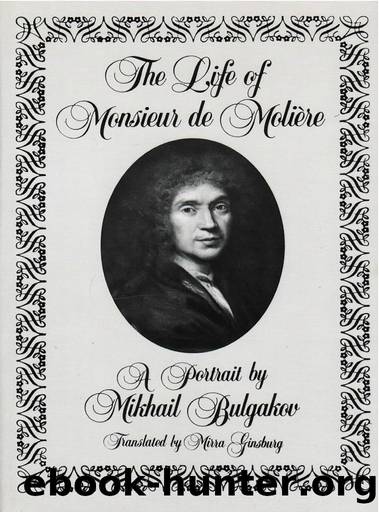The Life of Monsieur de Molièr by Mikhail Bulgakov

Author:Mikhail Bulgakov
Language: eng
Format: azw3
ISBN: 9780811209564
Publisher: New Directions
Published: 2013-10-14T23:00:00+00:00
Donât force your talent!
âLA FONTAINE
During this period of his life, Molière made the serious mistake of listening to the evil spoken of him. The insults which he should have ignored cut him to the quick. From the very moment his comedies and the short farces with which he accompanied the longer plays appeared on the stage, the literary gentlemen of Paris began to say in chorus that Molière was an empty buffoon, incapable of treating serious themes. And there were dozens of people who repeated it. True enough, this view was rejected by certain individuals, among them the famous and highly talented fabulist La Fontaine, who subsequently became one of Molièreâs best friends. After Molièreâs first performances, La Fontaine exclaimed:
âThis is a man after my own taste!â
Molière, said La Fontaine, was magnificently faithful to truth and nature. However, instead of paying attention to La Fontaine, Molière listened to critics of quite a different order. And he resolved that he would prove to the world his ability to treat eternal themes, like jealousy, which he had used to comic effect in The Imaginary Cuckold, in a serious vein as well. To this end, he would bring forward a hero belonging to the highest social strata. And so, he composed a heroic comedy under the title of Don Garcia of Navarre, or the Jealous Prince.
The superintendent had meantime completed the Palais Royal. Everything was put in order, and a vast pale blue cloth was stretched under the ceiling, serving a dual purpose: to charm the viewerâs eye with the illusion of an artificial sky, and to keep rain from dripping on him, since the ceiling continued to leak despite Monsieur Ratabonâs repairs.
On January 20, 1661, Molièreâs troupe established itself at the Palais Royal. It was followed by the Italian company, which had returned to Paris. Once again the days of the week were divided between the two companies, but this time the Italians paid Molière, to compensate him for the expenditures incurred in refurbishing the theater. These expenditures, it must be said, had been incurred because the funds allotted by the treasury had proved insufficient.
The Palais Royal was flooded with light, and the dark forebodings that the theater would not regain its place were dissipated at once. The public responded enthusiastically to Molièreâs plays, and it became clear once and for all that they put into the shade the plays of all the other playwrights.
Everything seemed to be going well until the appearance of The Jealous Prince on the stage on February 4. Enormous sums had been spent for the lavish production, and the director of the company himself, who had evidently forgotten how he had been pelted with apples, came forward in the role of the magnificent prince.
The public prepared itself eagerly to view Monsieur de Molièreâs new work, and listened with benevolent attention to Elvireâs first monologue, delivered by Marquise-Thérèse du Parc. Then the Prince appeared and began his flowery monologues about glorious dangers, Donna Elvireâs shining eyes, and other elevated subjects.
Download
This site does not store any files on its server. We only index and link to content provided by other sites. Please contact the content providers to delete copyright contents if any and email us, we'll remove relevant links or contents immediately.
What's Done in Darkness by Kayla Perrin(25500)
Shot Through the Heart: DI Grace Fisher 2 by Isabelle Grey(18220)
Shot Through the Heart by Mercy Celeste(18160)
The Fifty Shades Trilogy & Grey by E L James(17775)
The 3rd Cycle of the Betrayed Series Collection: Extremely Controversial Historical Thrillers (Betrayed Series Boxed set) by McCray Carolyn(13189)
The Subtle Art of Not Giving a F*ck by Mark Manson(12912)
Scorched Earth by Nick Kyme(11832)
Stepbrother Stories 2 - 21 Taboo Story Collection (Brother Sister Stepbrother Stepsister Taboo Pseudo Incest Family Virgin Creampie Pregnant Forced Pregnancy Breeding) by Roxi Harding(11040)
Drei Generationen auf dem Jakobsweg by Stein Pia(10217)
Suna by Ziefle Pia(10186)
Scythe by Neal Shusterman(9262)
International Relations from the Global South; Worlds of Difference; First Edition by Arlene B. Tickner & Karen Smith(8608)
Successful Proposal Strategies for Small Businesses: Using Knowledge Management ot Win Govenment, Private Sector, and International Contracts 3rd Edition by Robert Frey(8419)
This is Going to Hurt by Adam Kay(7695)
Dirty Filthy Fix: A Fixed Trilogy Novella by Laurelin Paige(6453)
He Loves Me...KNOT by RC Boldt(5804)
How to Make Love to a Negro Without Getting Tired by Dany LaFerrière(5378)
Interdimensional Brothel by F4U(5304)
Thankful For Her by Alexa Riley(5161)
